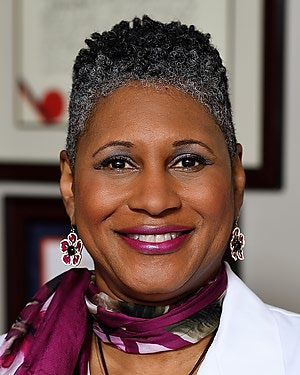Background
Dr. Sherita Hill Golden is the Hugh P. McCormick Family Professor of Endocrinology and Metabolism and Vice President and Chief Diversity Officer for Johns Hopkins Medicine. She holds joint appointments in the Welch Center for Prevention, Epidemiology, and Clinical Research, in the Department of Epidemiology at the Johns Hopkins Bloomberg School of Public Health, and in the Armstrong Institute for Patient Safety and Quality. An internationally recognized physician-scientist and member of the National Academy of Medicine, the Association of American Physicians, and the American Society of Clinical Investigation, Dr. Golden’s research has used the tools of epidemiology and health services research to identify biological and systems contributors to disparities in type 2 diabetes and its outcomes. She is the author of more than 200 articles focused on diabetes, endocrinology, and health disparities. In order to more directly address the root causes of health inequities identified through her research, Dr. Golden has used her executive leadership roles to develop systems, community, and policy interventions. As inaugural Executive Vice-Chair of the Department of Medicine at Johns Hopkins School of Medicine (2015-2019), she launched a department-wide civic engagement initiative, resulting in programs that addressed community-related concerns and enhanced employee engagement following Baltimore’s civil unrest surrounding the 2015 death of Freddie Gray. In her current role Vice President and Chief Diversity Officer for Johns Hopkins Medicine, she oversees diversity, inclusion, and health equity strategy and operations for the School of Medicine and Johns Hopkins Health System. She has executed implementation of Culturally and Linguistically Appropriate Services Standards, staff training for accurate collection of self-identified patient demographic data, a system-wide policy prohibiting patient discrimination toward employees and trainees, and a system-wide unconscious bias and anti-racism train-the-trainer program. During COVID-19 she facilitated mobile community testing for the underserved in Baltimore City and equitable vaccine distribution to non-clinical, minoritized frontline staff across JHM. Dr. Golden is a leader in the national discussion advancing health equity, including supporting Maryland legislators in drafting and testifying in support of state-level health equity policy.
In 2017 she was the co-recipient of the Walter Reed Distinguished Achievement Award from the University of Virginia School of Medicine, Medical Alumni Association, and Medical School Foundation, which recognizes professional accomplishment, outstanding innovation, and exemplary leadership in the field of Medicine. In 2018 Dr. Golden was named a winner of the 17th Annual Women Worth Watching Awards from the Profiles in Diversity Journal. She was one of 132 winners from across the globe recognized as an executive leading the way to excellence in the workplace, marketplace and the world. Dr. Golden is also the recipient of the 2019 University of Virginia Distinguished Alumna Award and in 2020 she was named a Maryland Top 100 Woman. She was recently named a 2021 Baltimore Sun 25 Woman to Watch.
Dr. Golden graduated Phi Beta Kappa and summa cum laude from the University of Maryland, College Park and Alpha Omega Alpha from the University of Virginia School of Medicine before training in Internal Medicine and Endocrinology, Diabetes, and Metabolism at the Johns Hopkins Hospital. During her endocrinology fellowship she received a Master of Health Science degree in Clinical Epidemiology from the Johns Hopkins University Bloomberg School of Public Health where she was elected to the Delta Omega Public Health Honorary Society.


Patient Ratings & Comments
The Patient Rating score is an average of all responses to physician related questions on the national CG-CAHPS Medical Practice patient experience survey through Press Ganey. Responses are measured on a scale of 1 to 5, with 5 being the best score. Comments are also gathered from our CG-CAHPS Medical Practice Survey through Press Ganey and displayed in their entirety. Patients are de-identified for confidentiality and patient privacy.